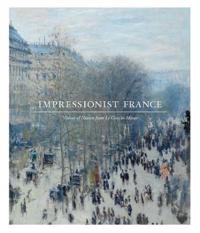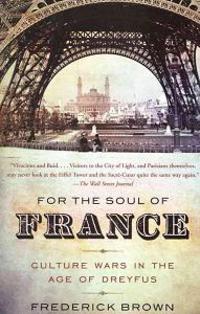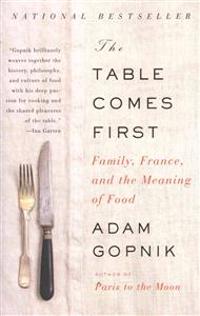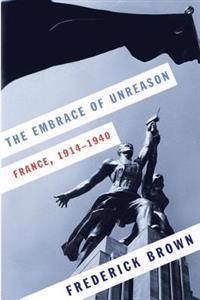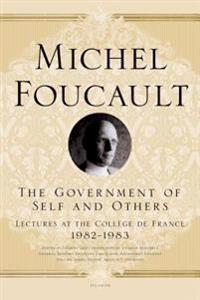France 1940 (Inbunden)
avPhilip Nord
ISBN: 9780300189872 - UTGIVEN: 2015-04In this revisionist account of France's crushing defeat in 1940, a world authority on French history argues that the nation's downfall has long been misunderstood. Philip Nord assesses France's diplomatic and military preparations for war with Germany, its conduct of the war once the fighting began,[...]
Impressionist France (Häftad)
avSimon Kelly, April M. Watson
ISBN: 9780300196955 - UTGIVEN: 2013-10Between 1850 and 1880, Impressionist landscape painting and early forms of photography flourished within the arts in France. In the context of massive social and political change that also marked this era, painters and photographers composed competing visions of France as modern and industrialized o[...]
Blanche of Castile, Queen of France
ISBN: 9780300219265 - UTGIVEN: 2017-01This is the first modern scholarly biography of Blanche of Castile, whose identity has until now been subsumed in that of her son, the saintly Louis IX. A central figure in the politics of medieval Europe, Blanche was a sophisticated patron of religion and culture. Through Lindy Grant's engaging acc[...]
Picturing War in France, 1792-1856
ISBN: 9780300228267 - UTGIVEN: 2018-02From the walls of the Salon to the pages of weekly newspapers, war imagery was immensely popular in postrevolutionary France. This fascinating book studies representations of contemporary conflict in the first half of the 19th century and explores how these pictures provided citizens with an imagina[...]
The Duel For France, 1944 (häftad)
ISBN: 9780306809385 - UTGIVEN: 2000-06For the Allies, D day was only the beginning. Having succeeded in that epic venture, they faced the prospect of moving beyond the beaches of France.For the Germans who had failed to halt the Allies at the water's edge, the question was how to stop the enemy from further advance before it was too lat[...]
My Life in France (Häftad)
avJulia Child
ISBN: 9780307277695 - UTGIVEN: 200710A memoir begun just months before Child's death describes the legendary food expert's years in Paris, Marseille, and Provence and her journey from a young woman from Pasadena who cannot cook or speak any French to the publication of her legendary Mastering cookbooks and her winning the hearts of Ame[...]
For the Soul of France: Culture Wars in the Age of Dreyfus (Häftad)
avFrederick Brown
ISBN: 9780307279217 - UTGIVEN: 2011-02Bad Faith: A Forgotten History of Family, Fatherland and Vichy France (Häftad)
avCarmen Callil
ISBN: 9780307279255 - UTGIVEN: 2007-12"Bad Faith "tells the story of one of history's most despicable villains and con men--Louis Darquier de Pellepoix, Nazi collaborator and "Commissioner for Jewish Affairs" in France's Vichy government.
Darquier set about to eliminate Jews in France with brutal efficiency, delivering 75,000 men, w[...]The Table Comes First: Family, France, and the Meaning of Food (Häftad)
avAdam Gopnik
ISBN: 9780307476968 - UTGIVEN: 201208From the author of "Paris to the Moon," a beguiling tour of the morals and manners of our present food mania, in search of eating's deeper truths.
Never before have we cared so much about food. It preoccupies our popular culture, our fantasies, and even our moralizing. With our top chefs as deit[...]The Embrace of Unreason: France, 1914-1940 (Inbunden)
avFrederick Brown
ISBN: 9780307595157 - UTGIVEN: 2014-04From acclaimed biographer and cultural historian, author of "For the Soul of France" ("Masterful history" --Henry Kissinger), "Zola" ("Magnificent" --"The New Yorker"), and "Flaubert "("Impeccable" --James Wood, cover, "The New York Times Book Review")--a brilliant reconsideration of the events and [...]
The Embrace of Unreason: France, 1914-1940 (Häftad)
avFrederick Brown
ISBN: 9780307742360 - UTGIVEN: 2015-01Spanning the turbulent decades between the World Wars, "The Embrace of Unreason" casts new light on the darkest years in modern French history. It is a fascinating reconsideration of the political, social, and religious movements that led to France's move away from the humanistic traditions and rati[...]
Fodor's France 2013 (Häftad)
avFodor Travel Publications
ISBN: 9780307929389 - UTGIVEN: 201211Covering the worlds of culture and history, the "dernier cri" in fashion and cuisine, what's hot/what's not, day trips, night life, and all the memorable sites--from gay Paree to Mont-St-Michel--that has made, and keeps, France as one of Europe's most popular destination, this edition delivers non-f[...]
The Hermeneutics of the Subject: Lectures at the College de France 1981-82 (Inbunden)
avMichel Foucault, Frederic Gros, Francois Ewald
ISBN: 9780312203269 - UTGIVEN: 200504"The Hermeneutics of the Subject" is the third volume in the collection of Michel Foucault's lectures at the College de France, one of the world's most prestigious institutions. Faculty at the College give public lectures, in which they present works-in-progress on any subject of their choosing. Fou[...]
Psychiatric Power: Lectures at the College de France, 1973-1974 (Häftad)
avMichel Foucault, Jacques Lagrange, Francois Ewald
ISBN: 9780312203313 - UTGIVEN: 200806In "Psychiatric Power," the fourth volume in the collection of his groundbreaking lectures at the College de France, Michel Foucault addresses and expands upon the ideas in his seminal "Madness and Civilization," sketching the genealogy of psychiatry and of its characteristic form of power/knowledge[...]
The Birth of Biopolitics: Lectures at the College de France, 1978-1979 (Häftad)
avMichel Foucault, Michel Senellart, Francois Ewald
ISBN: 9780312203412 - UTGIVEN: 201003Security, Territory, Population: Lectures at the College de France 1977-1978 (Häftad)
avMichel Foucault, Michel Senellart, Francois Ewald
ISBN: 9780312203603 - UTGIVEN: 200902Marking a major development in Foucault's thinking, this book takes as its starting point the notion of "biopower," studying the foundations of this new technology of power over populations. Distinct from punitive disciplinary systems, the mechanisms of power are here finely entwined with the techno[...]
Marie Antoinette: The Last Queen of France (Häftad)
avEvelyne Lever
ISBN: 9780312283339 - UTGIVEN: 200109A biography of the French queen explores the intrigue surrounding her life from her birth, through her unhappy marriage, her lavish life at Versailles, to the events leading up to her death by beheading during the French Revolution.[...]
French Revolutions: Cycling the Tour de France (Häftad)
avTim Moore
ISBN: 9780312316129 - UTGIVEN: 200306The humorous account of an amateur's participation in the Tour de France documents his resolve to complete all 2,256 miles of the competition, his use of hay fever pills for ephedrine boosts, his addition of cheap wine to his water bottle, and his encounters with some of the race's top heroes, inclu[...]
The Lost King of France: How DNA Solved the Mystery of the Murdered Son of Louis XVI and Marie Antoinette (Häftad)
avDeborah Cadbury
ISBN: 9780312320294 - UTGIVEN: 2003-10Traces the story of the missing dauphin and heir of the executed Louis XVI and Marie Antoinette, examining historic events from multiple angles and presenting DNA evidence to reveal new conclusions. Reprint. 15,000 first printing.[...]
Society Must Be Defended: Lectures at the Collhge de France, 1975-76 (Häftad)
avMauro Bertani, Alessandro Fontana, Francois Ewald
ISBN: 9780312422660 - UTGIVEN: 200312An examination of the relation between war and politics, by one of the twentieth century's most influential thinkers
From 1971 until 1984 at the College de France, Michel Foucault gave a series of lectures ranging freely and conversationally over the range of his research. In "Society Must Be De[...]Marianne in Chains: Daily Life in the Heart of France During the German Occupation (häftad)
ISBN: 9780312423599 - UTGIVEN: 2004-06In France, the German occupation is called simply the "dark years." There were only the "good French" who resisted and the "bad French" who collaborated. Marianne in Chains, a broad and provocative history drawing on previously unseen archives, firsthand interviews, diaries, and eyewitness accounts,[...]
Abnormal: Lectures at the College de France 1974-1975 (Häftad)
avMichel Foucault, Valerio Marchetti, Antonella Salomoni
ISBN: 9780312424053 - UTGIVEN: 200409From 1971 until his death in 1984, Foucault gave public lectures at the world-famous College de France. Attended by thousands, these were seminal events in the world of French letters. Picador is proud to be publishing the lectures in thirteen volumes.
The lectures comprising "Abnormal begin by e[...]The Hermeneutics of the Subject: Lectures at the College de France 1981-1982 (Häftad)
avMichel Foucault, Frederic Gross, Francois Ewald
ISBN: 9780312425708 - UTGIVEN: 200512"The Hermeneutics of the Subject" is the third volume in the collection of Michel Foucault's lectures at the College de France, where faculty give public lectures on any topic of their choosing. Attended by thousands, Foucault's lectures were seminal events in the world of French letters, and his id[...]
The Government of Self and Others: Lectures at the College de France, 1982-1983 (Häftad)
avMichel Foucault, Arnold I. Davidson
ISBN: 9780312572921 - UTGIVEN: 201104


